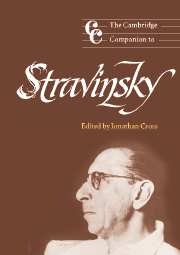Book contents
- Frontmatter
- Part I Origins and contexts
- Part II The works
- Part III Reception
- 9 Stravinsky conducts Stravinsky
- 10 Stravinsky as devil: Adorno's three critiques
- 11 Stravinsky in analysis: the anglophone traditions
- 12 Stravinsky and the critics
- 13 Composing with Stravinsky
- 14 Stravinsky and us
- Chronological list of works
- Notes
- Select bibliography
- Index
14 - Stravinsky and us
from Part III - Reception
Published online by Cambridge University Press: 28 September 2011
- Frontmatter
- Part I Origins and contexts
- Part II The works
- Part III Reception
- 9 Stravinsky conducts Stravinsky
- 10 Stravinsky as devil: Adorno's three critiques
- 11 Stravinsky in analysis: the anglophone traditions
- 12 Stravinsky and the critics
- 13 Composing with Stravinsky
- 14 Stravinsky and us
- Chronological list of works
- Notes
- Select bibliography
- Index
Summary
When, at the dawn of the third millennium, we use the word ‘Stravinsky’, we no longer merely name a person. We mean a collection of ideas – ideas embodied in, or rather construed out of, a certain body of highly valued musical and literary texts that acquired enormous authority in twentieth-century musical culture. That authority and its consequences are what have been preoccupying my thoughts about Stravinsky since completing Stravinsky and the Russian Traditions, which, though published in 1996, was not as recent a study as it seemed. It had spent almost seven years in press, during which time my thinking about the bundle of notions called ‘Stravinsky’ underwent considerable change.
In keeping with the scholarly tradition in which I was trained, my book was almost wholly concerned with the production of those texts, and with determining their place within the historical context contemporaneous with them. My thinking since has been more concerned with the relationship between those texts, and the ideas construed from them, and the contexts in which they have existed since the time of their production, up to their present contexts, including this book. Just as in Stravinsky and the Russian Traditions I considered the reciprocal manner in which Stravinsky received influences from his surroundings and influenced those surroundings in turn, so I continue to be interested in that reciprocity of influence in the period since his death.
- Type
- Chapter
- Information
- The Cambridge Companion to Stravinsky , pp. 260 - 284Publisher: Cambridge University PressPrint publication year: 2003
- 5
- Cited by

